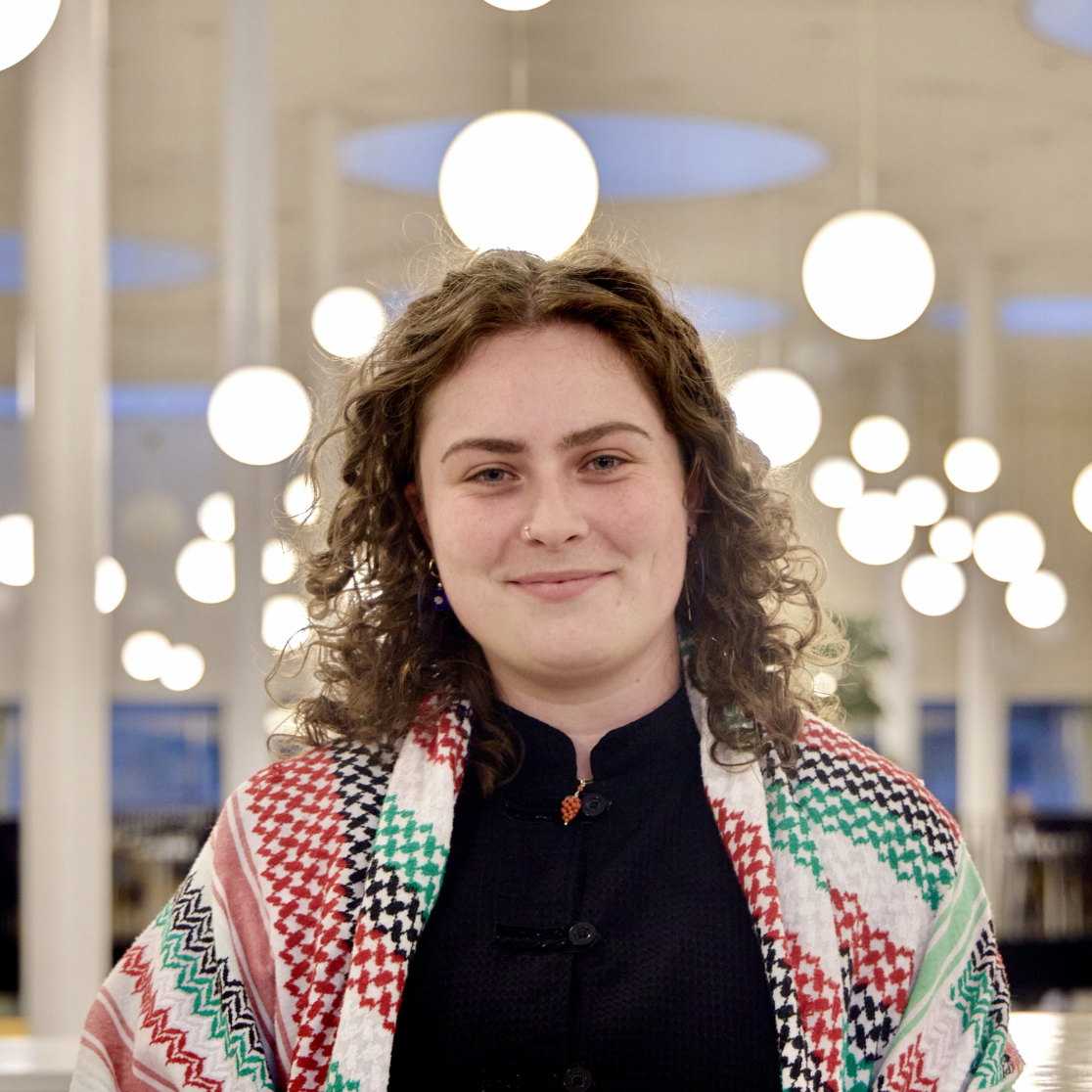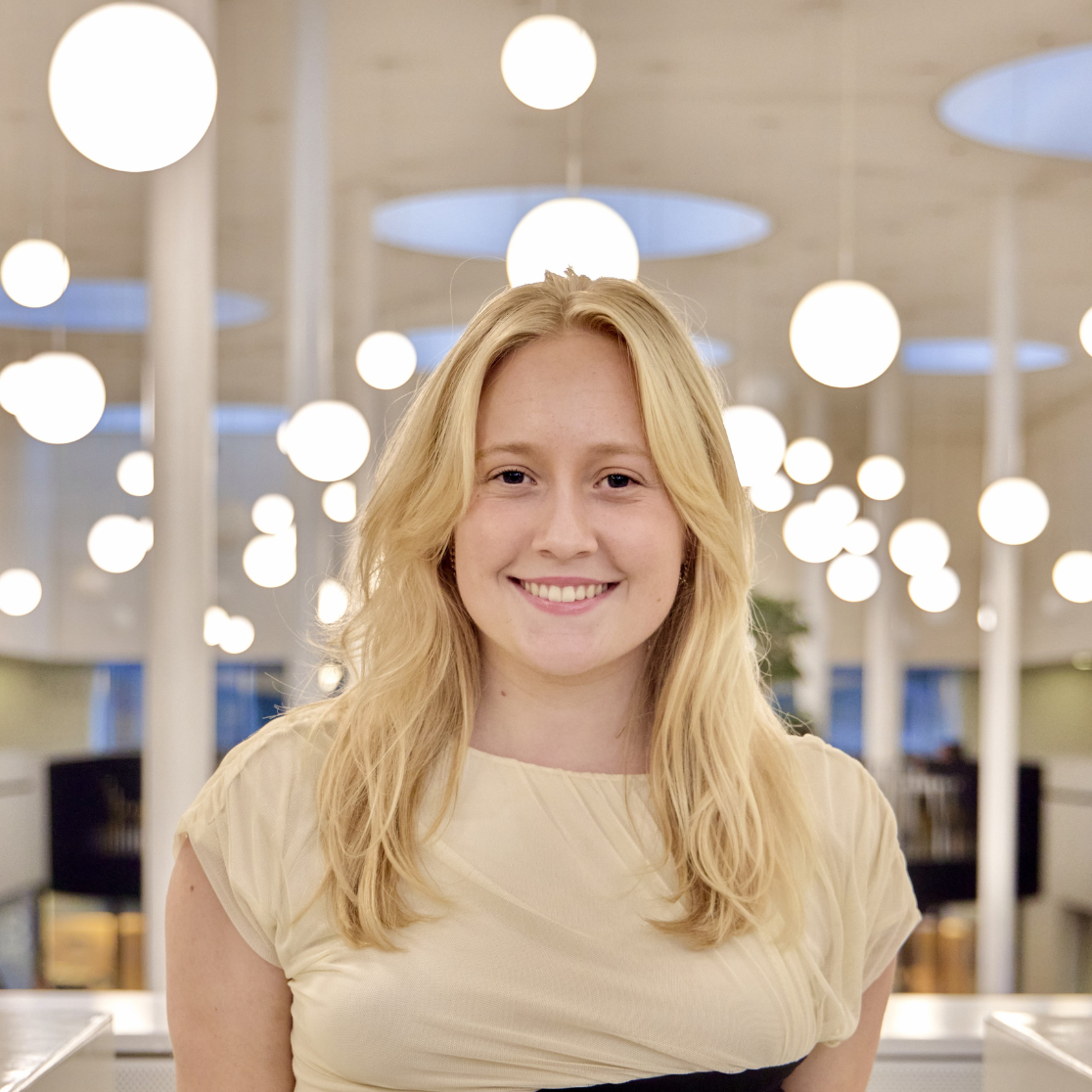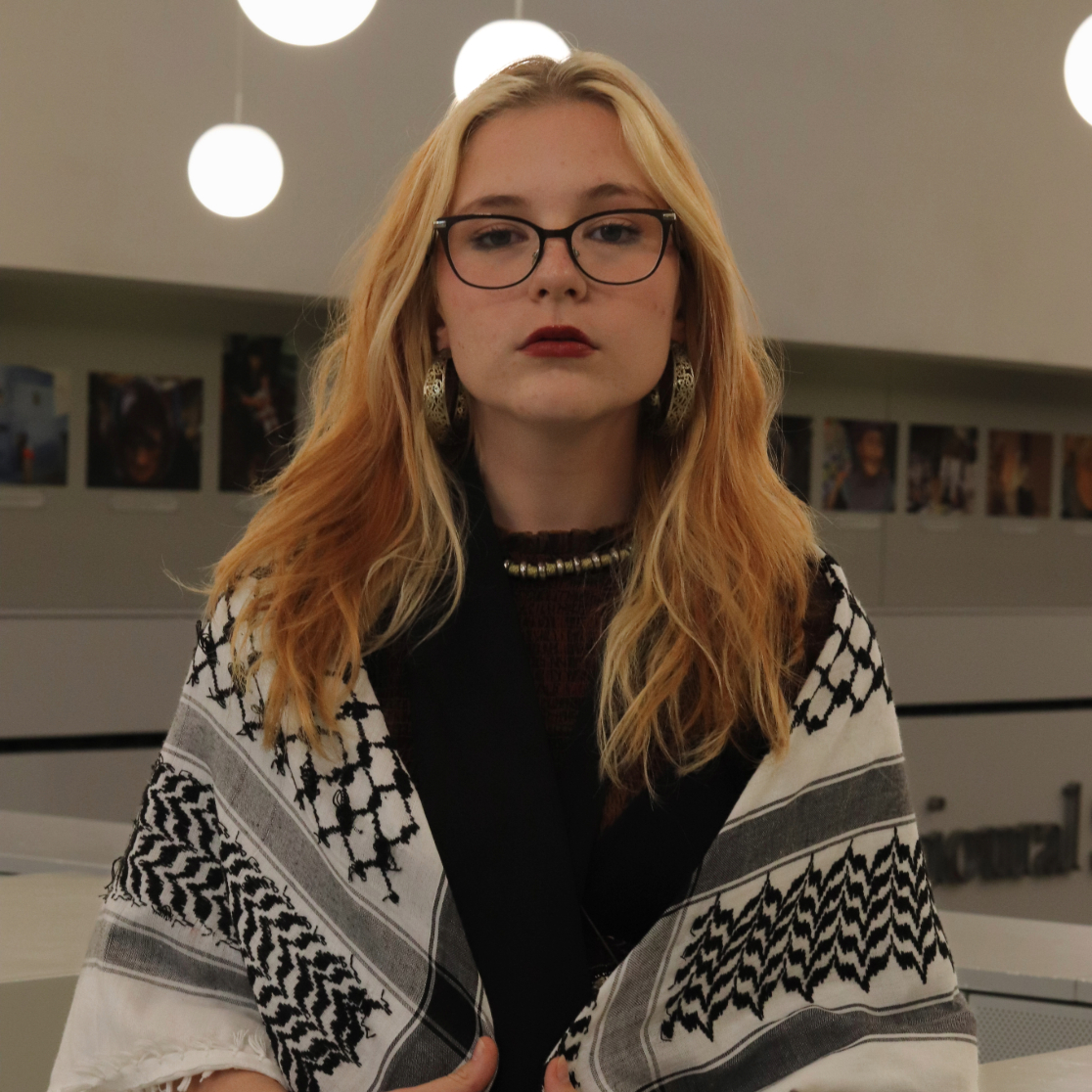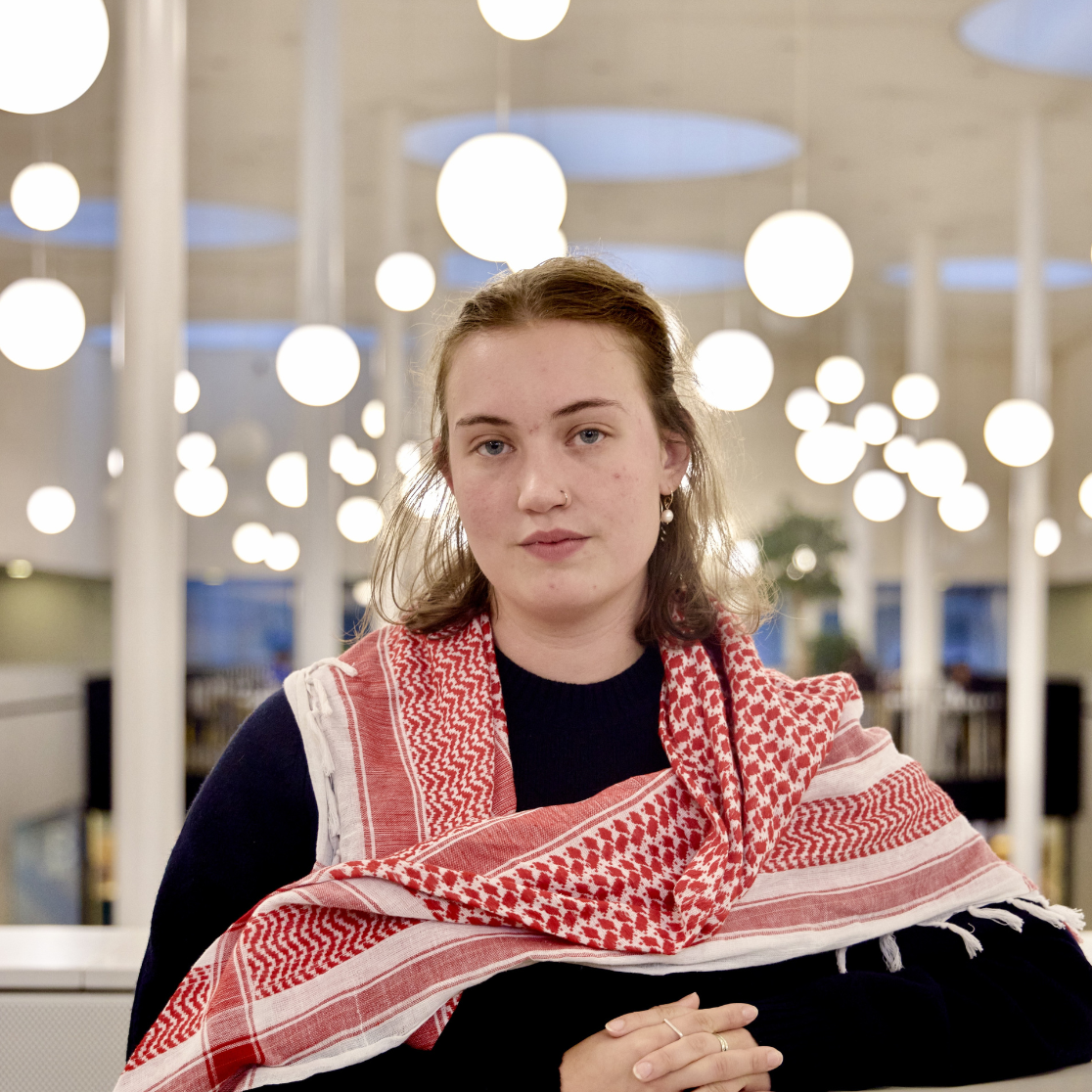Who are we
The Central Student Council (CSR) consists of fourteen students who are committed to representing the interests of UvA students during an academic year. Seven students are directly democratically elected to the CSR, while the other seven are delegated by the seven different Faculty Student Councils (FSR). The CSR has an executive board consisting of the chairman, vice-chairman, committee chairmen and official secretary.

Pieter-Joost van der Plas
Chair Committee Organisation and Finances (O&F)
pieterjoost.vanderplas@studentenraad.nl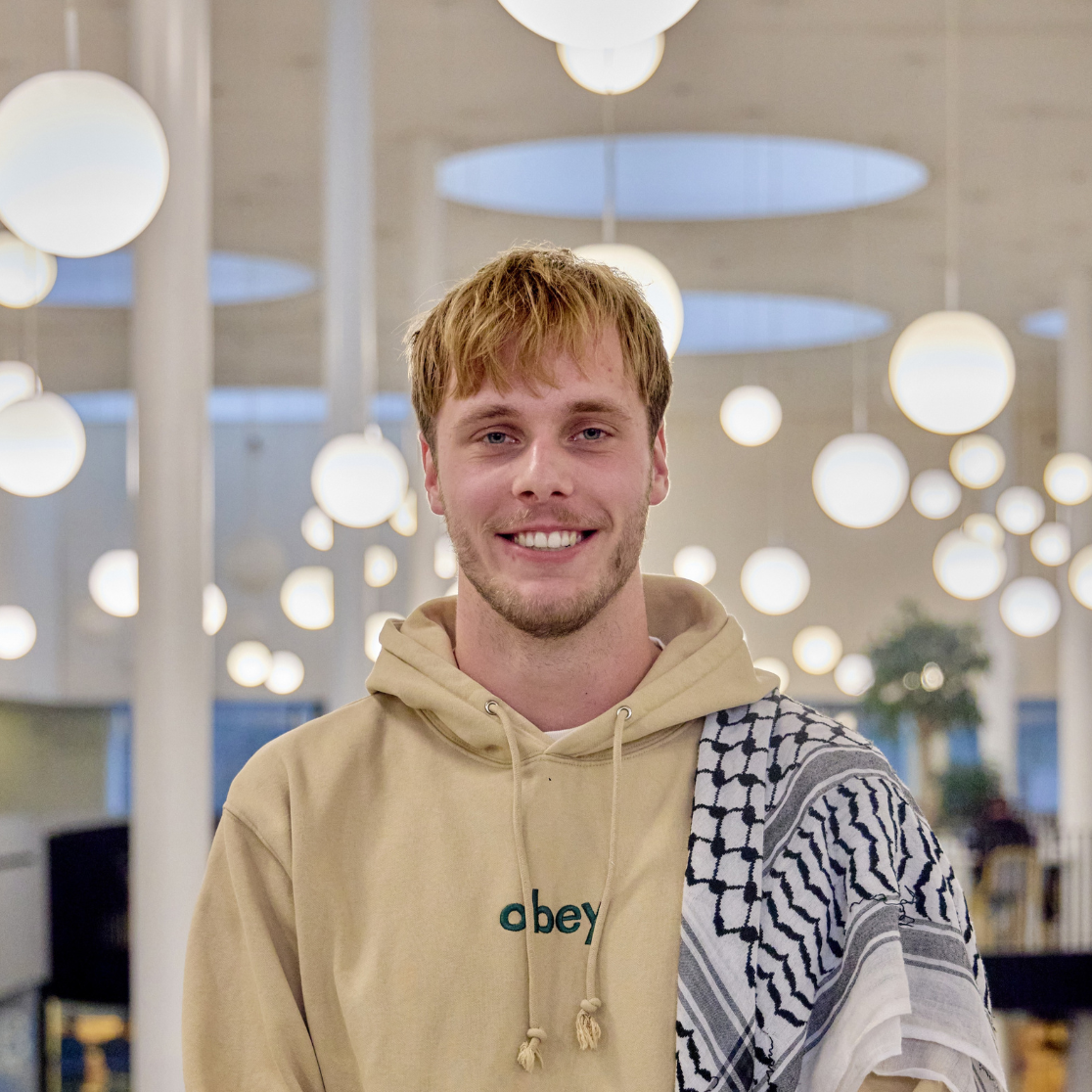
Victor Nieboer
Chair Committee Outreach and Inclusie (O&I), FNWI Delegate
victor.nieboer@studentenraad.nlStatement on Appointment of the Chair of the Executive Board
In the selection procedure, only one CSR member is included in the conversations with the candidates, and they are not allowed to consult with the rest of the elected council or the broader student population. Today, the candidate was brought before the whole council for formal advice, but the CSR knew the council’s opinion would not affect the outcome of the process and abstained from voting. Again, this does not stem from the council’s opinion on the candidate. The intransparency of the procedure prevented the student representatives from advising on behalf of the students.
Statement on Maagdenhuisincident
On 1st of September 2025, the Central Student Council was invited to the Opening of the Academic Year. Multiple members were in attendance for the event in the Aula.
After a disruption by Pro-Palestine demonstrators, the rest of the programme in the Aula had been cancelled and festivities moved to Maagdenhuis. The council followed suit and proceeded to the Maagdenhuis.
While some of our council members were granted entry, others were not. We were kept waiting at the door, with other attendees being able to enter freely. We explained that we were from the council, that we had been invited to the event on the basis of working for the university, but were not successful. Those present have heard the members of security refused entry based on some members wearing keffiyehs, a traditional Palestinian scarf. The members of the council did not initiate the disruption, but wore the keffiyah as is their right.
Attempts were made to contact administration to let us in, but ultimately we were not granted entry. A security guard proceeded to take a photo of us as well, the purpose of which is not known to us.
The CSR finds this a major concern, as democratically-elected representatives were, seemingly, denied entry based on attire. We have spoken of the incident with Peter-Paul Verbeek, who has expressed regret for the way this situation turned out. Nevertheless, we find it our duty as a representative body meant to protect students’ interests to publicly inform of this incident and will work with the CvB to ensure this was an isolated case.
Statement on June 2nd Roeterseiland Encampment
The Central Student Council [CSR] of the University of Amsterdam stands in solidarity with the student encampment set up at Roeterseiland Campus on June 2nd. The demands of the student protesters, including the immediate suspension of ties with Israeli universities complicit in genocide, are in line with our own stances on the matter.
We are also pleased to see that the UvA Executive Board [CvB] decided not to file a police complaint against the student activists and that the encampment was able to continue without incident. We are also glad that the UvA chose to follow the recommendations of the Berenschot report and engaged in talks with the student representatives.
At the same time, we are highly concerned about the current tension within the negotiations. We call on the CvB to resume the talks in good faith, and to find a solution that would lead to student proposals being implemented at the shortest possible notice. We again underline the fact that these proposals align with the advice provided to the Executive Board by the UvA student and staff representative bodies.
Statement on the April 14th Maagdenhuis Occupation
On Monday, April 14th, a group of students occupied UvA’s administrative building, the Maagdenhuis. They demanded academic boycott from Israeli institutions complicit in the genocide of the Palestinian people. The occupation did not appear from a vacuum but stemmed from a long-standing timeline of students and staff demanding accountability and ethics at the university – timeline during which the administration dismissed or simply did not engage with student voices. This stands in stark contrast to the response provoked by an action from just 50 alumni, who opposed the decision by UvA’s independent ethical committee (ACEC) to end a collaboration with the Hebrew University of Jerusalem. In reaction to this alumni protest, the CvB publicly expressed its intention to enter into a new partnership with the university – effectively disregarding the committee’s clear warning that such a partnership would “constitute an unwarranted stamp of approval of an institution that is implicated in gross and systematic violation of human rights.”
Last year, a mass mobilization of students was confronted with unseen levels of police violence on campus. Berenschot, a consultancy firm, carried out an independent evaluation of the CvB’s actions and highlighted that there was a significant lack of empathy towards students involved in demonstrations. This pattern happened again on Monday, with the CvB immediately rejecting discussions and filing a police report, which led to violence against the people outside the building, too. Peaceful participants in the support demonstration were beaten, not least in and around BG2.
The CSR recommends the CvB to follow independent assessments and reports, although critical of their policies and actions. Further, the CSR would like the CvB to address the substance of the demonstrations by submitting all collaborations to the assessment of the ACEC. That way, the expert body can give proper advice on the requests from the students and staff. If the CvB does not agree with the advice, then it should give appropriate justifications as to why they would like a certain collaboration to continue. Lastly, the CSR wishes to see the CvB take action in the direction of effective student representation. The Board must stop escalating and start listening: the breakdown in communication with students demands urgent, proactive steps from the administration towards its students.
Statement on the Recommendations by the Advisory Committee
The Central Student Council expresses its satisfaction with the recommendations issued by the Advisory Committee on Collaboration with Third Parties regarding the academic ties subject to its evaluation. In its advice, the Committee “believes that entering or renewing a university-wide collaboration with Hebrew University of Jerusalem would constitute an unwarranted stamp of approval of an institution that is implicated in gross and systematic violation of human rights in the region.”
We are pleased to see that the UvA Executive Board responded to repeated calls from the UvA community and chose to follow the negative advice regarding the student exchange with Hebrew University of Jerusalem, an institution deeply complicit in the Israeli government’s crimes in the Occupied Palestinian territories.
The negative opinion issued by the UvA Advisory Committee follows a pattern established by a similar body at Tilburg University, which recommended cutting its ties with Israeli institutions. That Advisory Committee advised Tilburg University to suspend, within the legal and administrative frameworks, the collaborative activities concerning both exchanges and research.
At the same time, the CSR underscores that the outbound exchange programme has been de facto suspended for over a year as a result of a negative travel advice. This decision reinforces the status quo. Also, the CSR would like to point out that the Advisory Committee evaluated four additional research projects in which Israeli researchers or companies participate, but that those results have not been made public. We also reiterate that our stance is to end all institutional ties with entities complicit in genocide and other atrocities.
In its recent advice on the framework used to assess the ties and the functioning of the Advisory Committee itself, the CSR focused on transparency and participation as crucial principles to guide the assessment process. Thus, we are highly disappointed not only by the Administration’s decision to keep the results secret but also by the fact that they kept the evaluation of these four projects from the student councils.
In consideration of all these points, we call for the Executive Board and the UvA Administration to make all of the evaluations public and sever all collaborations with Israeli institutions complicit in crimes against the Palestinian people.
Statement on the Proposed House and Demonstration Rules Approval Process
The Central Student Council (CSR) at the University of Amsterdam (UvA) is currently reviewing draft House and Demonstration Rules proposed by the UvA Executive Board (CvB). These rules are under scrutiny for their potential impact on the students’ rights to protest and expression.
What are our initial concerns? Analysis from the Prakken d’Oliveira law firm, commissioned by the CSR last year, has identified potential legal conflicts with Dutch and international law. Specific concerns include the proposals for compulsory identification requirements on the campus, a blanket ban on disruptive activities, and an automatic designation of all occupations as not peaceful. The full legal opinion can be accessed below.
What are the implications of the proposed rules? The adoption of these rules could lead to restrictions on student demonstrations and organizational activities. To ensure that the Council’s opinion is as informed as possible, the CSR voted to delay the final decision until late February and to request supplementary legal advice.
What are important stakeholders? The CSR and the Central Works Council, both vested with consent rights, will play an essential role in determining the adoption of the new rules.
Would you like to get involved and have your voice heard? The CSR encourages all students and UvA community members to remain engaged and informed as this process unfolds. You can reach out to us through the contact form on our website or through e-mail at csr@uva.nl.
Vote of no confidence in the CVB lifted
What does this mean for student representation at the UvA?
- Restating Student Power: The CSR lifts the vote of no confidence against UvA’s Executive Board! We’re committed to rebuilding a space for real democratic engagement and meaningful student action.
- Wins for Student Rights : Through the vote of no confidence and mediation we have secured key commitments on correcting tuition policies, the right to protest safely and ethical collaborations with Israeli academic institutions! This is about ongoing accountability and real, balanced governance.
Let’s keep challenging the status quo for a fair, inclusive, and just campus. Join us as we push for a UvA that truly reflects student voices, values, and power.
Want to learn more about the vote? See the document below!
What is the Student Council
The CSR works on UvA-wide topics, both important issues and seemingly less important issues that affect students on a daily basis. This includes major topics such as UvA housing plans and internationalization policy, but also smaller matters such as the opening hours of the UB library, cheaper and more vegetarian options in the canteen.
Every week the CSR has a plenary meeting (PV) to discuss current topics. Each PV is in principle an open meeting. Are you interested and would you like to come visit? Send an email to csr@uva.nl
Elections
The student council elections take place every year in May. If you are interested in exerting influence on the university administration, you can participate in the student council elections. You can join an existing party or start your own party. More information about the student council, what you do as a student council member and the existing parties can be found on the UvA website. If you have any questions, you can always contact us! Find more information about the elections here!
Rules and regulations
The CSR represents students at the Executive Board (CvB), the governing body of the UvA. The CSR has a formal meeting with the Executive Board every 6 weeks. In this meeting, the proposals from the CSR are discussed and a compromise is sought together. An important goal of this meeting is to obtain commitments. This means that the Executive Board is obliged to implement what they have approved. The Executive Board is obliged to listen to the CSR because the CSR has legal consent and advisory rights. The most important rights are the right to consent and the right to advice. Below is a comprehensive overview of all rights that the CSR has.
Lees meer
Rights
- Right to consent
- The decision cannot be made without consent (veto)
- Consent cannot be withdrawn without reason
- The Board of Directors / Dean must initiate a dispute
- Requirements:
- Consent must have a significant impact on decision-making
- “Yes, unless” or “No, except if”
- Powers:
- Main budget (GV)
- Strategic plan (GV)
- Administrative regulations (GV)
- Mergers
- Quality assurance system
- University part of student regulations
- Personnel policy (for staff representatives)
- Guidelines ex art 9.5 (model OER)
- Rules on safety, health, and well-being related to students
- Financial support for students (profiling fund)
- OER, excluding substantive parts (program committee and binding study advice)
- Faculty rules (specific approval rights for your own FSR can be found here)
- If applicable, the regulation for the student council
- Right to advice
- Advice must have a significant impact on decision-making
- The decision will proceed after negative advice
- Right to consultation before and after advice
- The board is not obligated to follow the advice
- But not following the advice requires a written substantive justification from the board
- Council has 4 weeks to initiate a dispute
- Dispute based on content or procedure
- Regarding:
- Budget
- Continuation and proper functioning of the institution
- Profiles and appointment/dismissal of members of the Board of Directors
- Policy on tuition fees, numerus fixus, selection criteria (students)
- All rights that are also centrally applicable and on which the faculty council can make decisions
- Proper functioning of the faculty
- Faculty financial annual report
- Faculty budget
- Board covenant
- OER (where there is no approval right)
- Implementation of the OER
- When requested
- Note: the program committee must send advice to the faculty council
- Deadlines: (www art 9.34.3.g)
- “The deadlines within which consent or abstention from consent must be decided and the deadlines within which advice must be given.”
- These Uni 30 working days = 6 weeks
- Right to information (www art. 9.32.6)
- The board must provide the Council with:
- “…unsolicited, timely information that may reasonably be necessary for the exercise of its tasks and, upon request, timely information that it deems necessary and appropriate for the exercise of its tasks.”
- The board must provide the Council with:
- Right to hearing (WHW art. 9.3. / 9.13):
- For example: appointment and dismissal of the dean.
- In the appointment of a director of a college or university, the dean confidentially consults with the student council.
- The right to put subjects on the agenda (WHW 9.32).
- The participation council can discuss any subject it wishes, even if the management believes the subject does not belong on the agenda.
- For this purpose, the council can invite the board twice a year to a meeting based on an agenda prepared by the council.
- Right of initiative (WHW 9.32.2).
- The council is authorized to make proposals and present views to the board of directors on all matters concerning the university. A written response must be provided within three months.
- The right to consult with the board (WHW art. 9.33).
- The participation council has the right to speak with the authorized executive (the ultimate responsible person).
- At least twice a year
- On every advice and consent request
- After each initiative.
- The participation council has the right to speak with the authorized executive (the ultimate responsible person).
- The right to take legal action (WHW 9.46).
- The participation council has the right to take legal action to enforce compliance with the WHW, and the university must bear the costs.
- The right to initiate a dispute resolution procedure (WHW art. 9.40).
- Dispute over approval authority
- Could the board reasonably make the proposed decision?
- Could the council reasonably withhold approval?
- Dispute over advisory authority
- Was the action of the council in accordance with the regulations?
- Was the action of the council negligent?
- Could the council reasonably take the action?
- Dispute over interpretation.
- Dispute over approval authority
- The right to facilities and training.
- Participation councils receive a budget for administrative, financial, and legal support.
- They are entitled to compensation in money or substitute hours for their efforts.
- They have the right to a training budget (training takes place during working hours for staff members and with salary retention).
Committees
The files that the CSR works on are divided among three committees:
Education and Policy (O&B), Organization and Finance (O&F), and Outreach and Inclusion (O&I)
Organization and Finance Committee (O&F)
The work of the O&F committee is to ensure that the university is well organized and has a
good financial policy. This is very important, because these are the basic conditions for a
good education system. Last year, for example, we successfully introduced free period
products on the busiest floor of every UvA building and made affordable vegan food
available in the canteen. Achievements like these show that while our work can be
challenging, it is also meaningful and rewarding. This year, some of our priorities are
safeguarding the quality of education and student well-being in the face of budget cuts,
expanding sustainable and affordable canteen options across all campuses, and promoting
the integration of international students in the Netherlands by guaranteeing free Dutch
courses for all students.
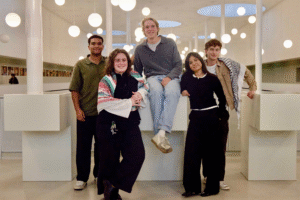
O&F Dossiers
Dossiers:
- Kwaliteitsafspraken
- In het coalitieakkoord werd aangegeven dat de middelen vrijgemaakt door de studievoorschotten worden gekoppeld aan ‘kwaliteitsafspraken op instellingsniveau’. Bij de UvA zijn de plannen met betrekking tot de kwaliteitsafspraken ontwikkeld in brede consultatie met de universitaire gemeenschap, en met name met de Centrale Studentenraad en de ondernemingsraad. De UvA heeft besloten zich te richten op de volgende thema’s: intensiever en kleinschaliger onderwijs, professionalisering van docenten, passende en goede onderwijsfaciliteiten. Op centraal niveau zijn twee thema’s uitgewerkt: professionalisering van docenten en onderwijsfaciliteiten. Het is de verantwoordelijkheid van de CSR om toe te zien op en advies te geven over de toewijzing van de financiering.
- Profileringfonds
- GALOP
- Campusontwikkeling
- Selectieprocedure decaan
- Duurzaamheid
- Duurzaam bankieren: Op basis van het werk van onze voorgangers hebben we de criteria ontwikkeld waaraan we willen dat de UvA zich houdt bij het kiezen van haar nieuwe bank. Door een duidelijke en beknopte basis te hebben voor wat we duurzaam beschouwen in de context van een financiële instelling, hopen we de White Paper-initiatief van de UvA buiten haar eigen campusmuren te brengen en ervoor te zorgen dat onze partners dezelfde milieu- en ethische code hanteren.
- Catering
- Dit jaar is er een groeiend momentum rondom catering, duurzaamheid en betaalbaarheid. Na ons advies heeft het CvB besloten om een subsidie voor een veganistische/vegetarische warme maaltijd pilot te starten op de UvA, vergelijkbaar met die op de HvA. De CSR heeft deelgenomen aan deze inspanningen door studentenprotesten zoals AntiKantine te ondersteunen en een voedingsfocusgroep in samenwerking te organiseren. De volgende stappen zullen zijn om te pleiten voor een andere structuur met betrekking tot catering op de UvA, in lijn met de discussie uit deze focusgroep. Het werken aan dit dossier houdt in dat er contact wordt gelegd met studenten, EnjoyToday, Green Office, Facility Services en het bestuur van de UvA. We hebben maandelijkse vergaderingen met Facility Services en regelmatig contact met EnjoyToday.
- Sociale veiligheid
- De extra financiering van 150.000 euro die is verworven voor het sociale veiligheidsbeleid van de UvA is een belangrijke prestatie die de toewijding van de commissie en de universiteit weerspiegelt om ervoor te zorgen dat alle personen zich veilig en gesteund voelen op de campus. De toewijzing van dit geld aan verschillende bewustmakingsactiviteiten en communicatie-upgrades, zoals Gelijkspel-cursussen en de oprichting van een e-learning module, zou zeker ten goede komen aan de UvA-gemeenschap. Deze prestaties markeren een kritieke stap voorwaarts in de voortdurende inspanningen om een veiliger en meer inclusieve campusomgeving voor allen te creëren. Onze samenwerking met de GV, CDO, Ombuds Office en Confidential Advisors biedt hoop op verbetering van de sociale veiligheid op de universiteit.
- Menstruatieproducten
- De prestaties op het gebied van menstruatie zijn opmerkelijk en duiden op een toewijding om de problemen aan te pakken waarmee menstrueerders te maken hebben. Naast de door CSR gefinancierde menstruatiepilot in samenwerking met studentenverenigingen en faculteitsraden, neemt de commissie concrete stappen om menstruatieproducten betaalbaarder en toegankelijker te maken. Een andere belangrijke prestatie die de ervaring van menstrueerders op de campus zal verbeteren, is de installatie van de eerste dispenser in de CREA-toiletten voor gratis toegang tot menstruatieproducten. Deze prestaties vertegenwoordigen een positieve verschuiving naar meer inclusiviteit en toegankelijkheid voor alle leden van de UvA-gemeenschap.
- Samenwerking met derde partijen
- Stille/contemplatieruimtes
- Bij recente renovatiewerkzaamheden aan het JK-gebouw zal de enige stille ruimte op Roeters worden gesloten. Ondertussen is de kamer lawaaierig, leeg en niet geschikt voor studenten die deze willen gebruiken. Dit probleem treft vooral moslimstudenten omdat zij vijf keer per dag religieuze verplichtingen hebben om te bidden. Vanwege het strenge “seculiere” beleid van de universiteit mogen studenten geen gebedsmatten of bedekkingen in de ruimte houden. We werken samen met de Muslim Association in Amsterdam (MUSA) om het beleid rondom de contemplatieruimtes te veranderen om de UvA-studenten beter te accommoderen. Wat we tot nu toe hebben bereikt, is dat de CSR, FSR en MUSA betrokken zullen zijn bij de nieuwe renovatie- en ontwerpplannen voor de contemplatieruimte in het JK-gebouw!
- Kadernota
- De kadernota vormt het begin van een nieuwe planning- en controlecyclus. In deze brief geven alle organisatorische eenheden van de UvA aan wat ze in het komende jaar willen bereiken, hoe ze dit gaan doen en hoeveel geld hiervoor nodig is. Het beschrijft vervolgens verwachte externe ontwikkelingen en financiële beperkingen. Met andere woorden, de eenheden kunnen de Framework brief als startpunt en basis gebruiken om hun begroting op te stellen. Het is een eerste stap naar het realiseren van een gebalanceerde begroting. De CSR heeft instemmingsrecht voor de Framework brief en is daarom betrokken bij het vormingsproces van de brief en geeft advies.
- Begroting
- De begroting laat zien hoe de plannen en ambities van de UvA passen in de financiële kaders zoals beschreven in de Raamwerkbrief. De CSR vormt samen met de ondernemingsraad de ‘Gezamenlijke Vergadering’. De begroting moet worden goedgekeurd door de Gezamenlijke Vergadering en is daarom een krachtig instrument om initiatieven te stimuleren die de studentenwelzijn verbeteren.
Outreach and Inclusion Committee (O&I)
The Outreach and Inclusion (O&I) committee concerns itself with student outreach and student wellbeing. The O&I committee is firstly responsible for all communication of the CSR to students, whether that be via our website, Facebook or social media presence. We aim to inform the over 40.000 students at the UvA of the inner workings of the university, its policies and the people shaping them. The Outreach and Inclusion Committee works to create a welcoming and supportive university. This involves working on mental health policy at the UvA, social safety, diversity and accessibility. We also help realize and improve contemplation rooms, where we want students to be able to pray or meditate in peace. The O&I committee improves student participation at the UvA, by organizing events, by working on democratization and decentralization efforts, and we help coordinate elections for the CSR and the FSRs.
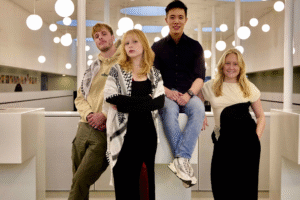
O&I Dossiers
- Elections
- The elections are the largest dossier within PR. The goal of the dossier is to organize smooth and engaging elections. An annual objective is to increase voter turnout, which has consistently decreased in recent years.
- Social Media
- The social media dossier involves creating and posting content on the CSR’s social media page. This includes updates on CSR progress, any petitions, or information about CSR responsibilities.
- Coffee with the CSR and Discussion Moment
- The idea of Coffee with the CSR is to stand next to the coffee machines at one of the UvA locations, wear CSR merchandise, and offer students our ‘free’ coffee in exchange for a chat.
- Merchandise
- Merchandise is used for events and to raise awareness for the CSR. Examples of merchandise include posters, bulletin boards, stickers, and sweaters.
- CoBo
- Every major student organization at UvA organizes the Constitution Borrel every year to celebrate the new board and the beginning of the new year. It is often held between September and December.
- Newsletter UvA
- The newsletter is sent every two weeks to all registered student and staff emails. We can send our text (400 characters) to the Communication Office. The text can include updates, requests for input, job vacancies, elections, etc.
- Website
- The CSR website needs to be changed. The previous CSR was already in contact with Saturno Web Developers but did not follow up. The website could use some updates on: availability of English and Dutch pages, standardization across faculty pages, contact form, etc. To maintain the website, we are in contact with the Faculty of Science.
- Mental Health Campaign
- The O&O committee, in collaboration with the O&M committee, has been planning to highlight the various mental health services available at UvA. We have noticed that the information available is not accessible to students, and most have no idea how to seek help. Therefore, we decided to use our social media and the UvA’s social media to promote such an important topic.
- Toilet Paper
- The Toilet Paper is regularly published (approximately every month) by the CSR and can be found in the bathrooms of CREA and the Singel Library. The publication is designed by a CSR member and can be printed for free with your printing budget.
- Teacher of the Year
- CSR and ASVA typically collaborate on the Teacher of the Year project. From the university side, we work with the Teaching and Learning Centre (TLC) and the Communication Office (BC). TLC handles a significant portion of the organizational work.
Education and Policy Committee (O&B)
The Education and Policy (O&B) committee oversees all matters regarding the learning
experience at the UvA. Importantly, we have a direct say in the internal quality of education at
the university through work on files such as the Model OER and Educational Vision. Utilizing
active experiences and feedback, this committee strives to create a dynamic, academic
environment reflecting student perspectives and needs. Through our two seats on the
University Education Committee (UCO), we also actively participate in the university’s main
policy body for all matters relating to educational quality. Furthermore, we stay current with
externally relevant matters such as Research and Collaboration Ethics, Internationalisation and
Language policy, and Digitalization and AI developments. Lastly, a key conversation remains
focused on understanding the university’s present position within Academic Freedom
standards. The O&B Committee aims to play a vital role in shaping UvA’s academic environment
through internal caliber and broader educational policy developments.
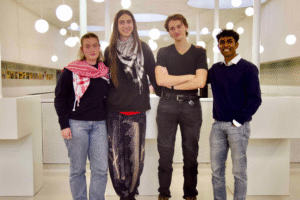
O&B Dossiers
- Accessibility
- The university currently provides certain accommodations for students with disabilities and/or chronic illnesses based on a case-by-case format. While some students are satisfied with the accommodations they have received, many struggle to get what they need to experience equal opportunities in higher education. Our progress includes:
- Commitment from the UvA board to create new policy rules to improve accessibility.
- Formation of a new working group with specific goals to evaluate the current process, explore ideas such as an expertise center, and propose monitoring and measuring the effectiveness of the policy.
- The CSR has a seat in the advisory board assisting this working group.
- Close collaboration with students with disabilities and/or chronic illnesses from various faculties through the FSRs.
- For the rest of the year, we hope to see real policy rules with concrete implementation prospects from the working group, as well as more short-term solutions for some of the more urgent issues.
- The university currently provides certain accommodations for students with disabilities and/or chronic illnesses based on a case-by-case format. While some students are satisfied with the accommodations they have received, many struggle to get what they need to experience equal opportunities in higher education. Our progress includes:
- Binding Study Advice (BSA)
- CSR advocates for abolishing the BSA and suggests a few alternatives. The current form of BSA can no longer achieve its original purpose. Studies show that the BSA is a significant stress factor for students, and it does not necessarily help students in ‘wrong’ study programs find more suitable studies. We see the BSA as a tool to produce more diplomas rather than promoting quality education and support for students. We believe more should be done in terms of alternatives to the BSA, such as proactive study assistance, advisory study advice (non-binding), or even trying orientation years.
- General Institutional Ethics Committee (AIEC)
- The AIEC is one of the 6 official advisory bodies of the UvA. The CSR has the right to appoint 2 student members for a term of 2 years to the AIEC and works within the committee to develop broad ethical guidelines regarding internal policies. This means that the CSR is directly involved in ensuring the ethics of the policies formed by the UvA, and these evaluations are sent directly to the executive board.
- Decentralized Selection
- There will be a legal amendment allowing programs to use the lottery system in their decentralized selection. The CSR wants to change the selection process to improve equality. We are looking at the implementation of this in the strategic plan and working with the FSRs to help them persuade their deans to change their system.
- Digitalization
- With the development of new AI technologies like Chat GPT, discussions are ongoing at the university about how to proceed and what adjustments will be made to education. We have been monitoring and discussing this topic internally. Soon, we will join a working group on this matter. Similarly, we have investigated and monitored developments in Proctoring. For example, Proctoring has been implemented in certain program selection processes that are inaccessible to students with certain disabilities. This is discussed in our accessibility dossier.
- Internationalization
- The university’s growth has led to various issues for international and Dutch students. Pending ministry guidelines, we have researched and negotiated at our level for actions that can be taken in the short and long term, from better accommodation of international classrooms to limiting growth through certain selection procedures. We have advocated with policy makers and the Executive Board for the policy measures we find suitable and will engage in the discussion on the implementation of ministry regulatory instruments once they are published.
- Language Policy
- In a bilingual university, it is not only important to have clear guidelines for language but also to support staff and students in their efforts to speak two languages. Therefore, we are conducting research and advocating for various language courses for international students to improve their Dutch and for Dutch students to improve their English if necessary. This is necessary to enable successful integration of international students into Dutch society and the job market, as well as to create a better sense of community between Dutch and international students.
- Student Wellbeing
- We work closely with the Student Wellbeing Network, our O&M committee, and the FSRs to improve the communication of mental health resources at the UvA. This includes exploring options to add information to course manuals or Canvas and improving the mental health pages on the university website so that students can find the resources they need. We also address this issue on a more structural level through our efforts to abolish the BSA and create alternatives.
- Current Relevant Topics
- Many of the current dossiers address topics relevant in this academic year. Nevertheless, we are open to discussing, researching, and advocating for other topics such as decolonization or improving course evaluations. The reason these topics do not have priority is not due to our values but simply a lack of manpower to address everything. Additionally, we must work on the topics presented to us, such as new programs or annual reports. Finally, we are also active in groups like EPICUR, a European university alliance to promote more collaboration in higher education in Europe.
- University Education Committee (UCO)
- The University Education Committee is an advisory body of the university board. This committee consists of representatives from the staff of various faculties, including the CSR. The UCO advises on major changes and proposals from the university.
- Institutional Quality Assurance Team (ITK)
- The ITK is a working group within the university consisting of representatives from the staff and one student. This group monitors progress towards the new NATO accreditation of the UvA to ensure that the university can withstand the accreditation process.
Documents
Regulations
CvB meetings (OV’s) agendas and minutes
October 14, 2025
September 9, 2025
2024-2025
2023-2024
Plenary Meetings agendas and minutes
November 2025
October 2025
September 2025
August 2025
2024-2025
2023-2024




